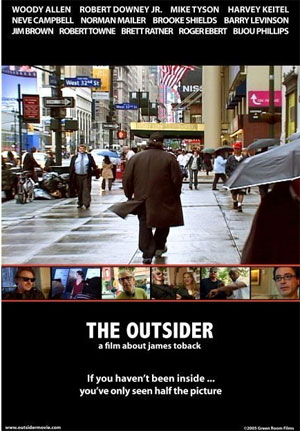 It’s another Jarecki and another documentary. The good news is that the Jarecki clan are three for three – Andrew has Capturing the Friedmans while Eugene has Why We Fight. Welcome young Nick Jarecki, just 26, and already the author of a book and the director of a compelling film about one of cinema’s oddest people, James Toback.
It’s another Jarecki and another documentary. The good news is that the Jarecki clan are three for three – Andrew has Capturing the Friedmans while Eugene has Why We Fight. Welcome young Nick Jarecki, just 26, and already the author of a book and the director of a compelling film about one of cinema’s oddest people, James Toback.
Toback is one of the more unique and often frustrating filmmakers. In recent years he seems to have settled into a career where he makes personal films for very little money, populated with actors willing to work for nothing just to say they’ve done a Toback film. The Outsider chronicles the making of Toback’s last film, When Will I Be Loved, which seems more like a reality show challenge than a movie shoot – Toback will get a 2 million dollar budget but he must finish the film in an incredible 12 days.
The Outsider does more than chronicle the making of the film, it explores who Toback is and how he’s become the idiosyncratic filmmaker he is today. Jarecki has put together an impressive list of people to talk Toback, including frequent collaborator Robert Downey Jr, Woody Allen, Brooke Shields, Norman Mailer, Jim Brown, Mike Tyson and Brett Ratner. The Outsider is the best kind of a documentary about a filmmaker – it will send you running off to fill your Netflix queue with Toback movies.
The film opens this weekend in New York City and will be headed to other cities in the weeks to come. You can get Jarecki’s book, Breaking In : How 20 Film Directors Got Their Start, from CHUD by clicking here.
Look for my exclusive interview with Toback, God and my transcribing skills willing, tomorrow.
Q: I have to start with a lame question: what is it about documentaries and the Jarecki clan?
Jarecki: I don’t think it’s a lame question at all. I think it’s an interesting question but I don’t know the answer. My brothers and I have different moms with the same dad, and none of our parents are in the movie business, so we have no connections. We all developed our interest in films separately; we don’t work together. We’re friendly but we’re all kind of on our own path. Andrew made a great film with Capturing the Friedmans, he got access to incredible material. Eugene had a more political bent. I’m more interested in human relationships, culture of celebrity and how we assign value in society.
I think documentaries are a great form because you can do things you wouldn’t otherwise be able to do. I made this film for no money.
Q: How much did it cost?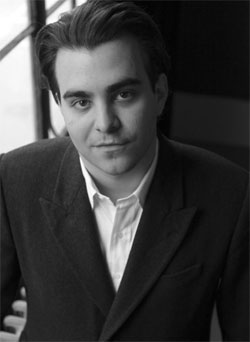 Jarecki: I don’t want to say the number, but it was let’s say one one hundredth of your typical movie budget. It was basically me, my camera and my time. I think anybody today with a digital camera and the will to do it can find their way into something interesting.
Jarecki: I don’t want to say the number, but it was let’s say one one hundredth of your typical movie budget. It was basically me, my camera and my time. I think anybody today with a digital camera and the will to do it can find their way into something interesting.
Q: What was Toback’s reaction when you told him you wanted to do a movie about him?
Jarecki: It happened in a very interesting way. I interviewed him for my book, Breaking In: How 20 Film Directors Got Their Start, and I remembered him out of the 20 men and women I interviewed as having the most interesting life story. He was a compulsive gambler, he lived with Jim Brown in this orgiastic house in the late 60s and 70s. When I first met him he weighed 260 pounds and he told me that at one time he wanted to be a professional member of Wimbledon. It seemed so insane to me, but then when I got to know more about his life, he was this handsome Jewish prince in his youth and a brilliant Harvard scholar and a degenerate gambler getting in trouble with the law. He had this fascinating life story and I heard he was doing this movie with Neve Campbell, When Will I Be Loved, so I called and asked if I could do a behind the scenes, little 5 minute thing for the DVD. He said, ‘Just show up. Be here tomorrow morning.’ We had no conversation and when I came to the set he said, ‘Just start shooting.’ The security personnel were ready to throw me out and he said, ‘No no no no, this guy’s OK, let him do anything he wants.’
I don’t know why he trusted me to that degree. He gave me access to everyone, to Neve and the crew – and then stuff started happening. Tyson came in and we had that great interview. Then I went back and contacting Woody Allen and Harvey Keitel and Brooke Shields, all these alter-egos of Toback, and see what they had to say. Then the film really developed from there.
It happened over the course of two years. It was a labor of love.
Q: Was there anyone who didn’t want to talk about Toback?
Jarecki: No. Pretty much everyone I contacted save one or two people who had scheduling things, was eager. It was not difficult. I think Toback inspires people to talk. He’s such a nut; there are so many things to say about him. His way of working is crazy, his personality is larger than life, he’ll go on with a story about Klaus Kinski trying to sleep with his daughter, when brought a suitcase in and threatened to kill a studio executive – there are so many exciting Toback moments that stick in your head.
Also he’s a very interesting filmmaker. Flawed, but has made some brilliant films along the way: The Gambler, Two Girls and a Guy, Bugsy, Fingers.
Q: Are there aspects of his films that might influence you on future movies?
Jarecki: I love the visceral nature of Toback’s films. He captures a carnality and a rawness that is pretty absent from cinema now. More in the 70s you saw complex characters that were haunted; endings like the ending of The Gambler, where he gets his face slashed and he looks in the mirror and he’s kind of happy because he took the ultimate gamble with his life and he lives to fight another day. Ambiguous, rawer films. What we see now is more polished. There are filmmakers still working that way, but less of them. And I think that’s a shame.
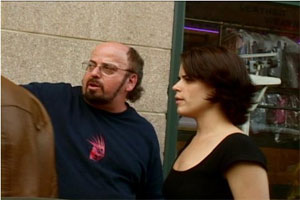 Q: This is a question I want to ask Toback, but I also want your take on it. Here’s this guy who’s a great writer, but now he’s making films without scripts. Why would a guy who is so good with words stop writing them?
Q: This is a question I want to ask Toback, but I also want your take on it. Here’s this guy who’s a great writer, but now he’s making films without scripts. Why would a guy who is so good with words stop writing them?
Jarecki: Black and White is the one film he made that was completely improvisational. Two Girls and Guy was heavily scripted; about two-thirds of the film was scripted and about a third was improvised. With this new film it was about 50/50.
I have a joke with the guy who helped me edit the film, J.C. Khoury: Downey says something in the documentary, he talks about the mirror scene in Two Girls and a Guy, how did it happen, and he says, ‘Well, we didn’t disallow the possibility.’ So my friend and I throw that around: ‘Never disallow! Never disallow!’ It’s funny but there’s also a truth in it; Toback in a way is a documentarian. He likes to set up a scene – and Altman does the same thing – and bring these chaotic forces together, like Tyson and Downey and tell Downey, ‘OK, you’re a gay guy, go hit on Mike’ and then not tell Mike what’s going to happen. And then Downey said to, ‘Jim, what if he kills me?’ and Toback said, ‘What better way to go?’
I think he likes to create the chaos and capture it because there’s a spontaneity to it. I think he mixes that in with the scripted aspects. It’s not 100% successful; Black and White was mostly improvised but the Ben Stiller scene was heavily scripted. And you can see that in the scene where he’s talking about ‘I’m Saul of Tarsus.’ That’s not going to be improvised. But that’s the kind of filmmaker he is. Why is Woody Allen obsessed with what he’s obsessed with? Who knows why filmmakers like what they do. It’s a cinematic preoccupation.
Q: You have the book and the documentary. Do you have another project lined up?
Jarecki: In the fall I’m going to direct a new film called The Informers, which I’ve written with Bret Easton Ellis, based on his best-selling book of the same name. We wrote this very crazy, multi-character, Short Cuts/Boogie Nights type movie that takes place in 1983 in Los Angeles and is about a rock star and a movie studio president and his wife and his mistress and a vampire and a kidnapper.
Q: And this is your first adaptation?
Jarecki: Yes, this is my first time adapting a book. I had written a couple of scripts before, none of which had been made.
Q: Did The Outsider help lead to that?
Jarecki: Absolutely. I called Bret Easton Ellis, who’s my favorite author of all time, and I just said, ‘I’ve read The Informers and I want to make it into a movie,’ and he said, ‘Who the hell are you?’ ‘I’m this guy, Nick Jarecki, and I wrote a book and made a movie.’ ‘Alright, send me everything and I’ll either call you back or I won’t.’ So I did, and he liked the movie, and we started trading ideas back and forth.
Q: Do you think you’ll use that Toback method of improvisation on The Informers?
Jarecki: I certainly would like to. I think it’s difficult to pull off. Toback has an advantage in that he has a body of 11 or 12 feature films he’s made, and I think he has a comfort level.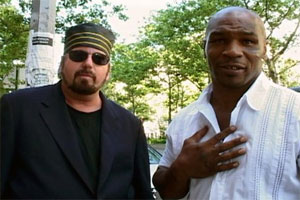 It’s very difficult; there are certain actors who hate to improvise. I met with an actress recently for this film who said, ‘I hate improvisation. I want to stick to the text. I think improvisation is dumb. I think it doesn’t come out.’ I don’t agree, but different people work in different ways. Again, it goes back to ‘Never disallow.’ You want to stay as open as possible, and just do whatever makes the best film.
It’s very difficult; there are certain actors who hate to improvise. I met with an actress recently for this film who said, ‘I hate improvisation. I want to stick to the text. I think improvisation is dumb. I think it doesn’t come out.’ I don’t agree, but different people work in different ways. Again, it goes back to ‘Never disallow.’ You want to stay as open as possible, and just do whatever makes the best film.
Q: When you’re making a film about Toback, who is so heavily into his own mythology, how important is the truth? I know at one point he claimed to have taken more hits of acid than any person in history – how important is it to get to the truth of that and how important is it to let the mythology be?
Jarecki: I think in many ways your question is the answer. What I wanted to do was present the man as I saw him. There was a good documentary about Robert Evans, The Kid Stays in the Picture. It opens with a quote from Evans: ‘There are three sides to every story: your side, my side and the truth.’ I believe that as a life philosophy. Did Toback take the most hits of acid in recorded human history? Maybe. Maybe not. I don’t really care. I think it’s funny that he says he did, and how he sees himself and how that affects his work.
You’re not meant to take everything that’s in there at face value. Bijou Phillips says in a clip that’s always hotly contested whenever I show the film to anybody, where she says, ‘Toback’s one of the greatest directors of all time and everybody knows that.’ If you threw the lightest ball in the air you might not hit someone who knows who James Toback is. When she says everybody knows he’s one of the greatest directors of all time, of course you’re not supposed to take that literally. It’s there to be playful. I wanted the film to be fun; I wanted people to have a good time when they go to see it. I didn’t want it to be the serious, studious portrait, because that’s not the kind of man he is. He’s an amusing bon vivant, and he knows it.
Q: What about the part about him trying to take out a hit on Barry Levinson?
Jarecki: That apparently is a true story. I haven’t confirmed with the hitman, but Barry and I have talked about this a few times. But I think that’s all I want to know. I don’t want to know any more!
Q: Could Toback make a mainstream film at this point?
Jarecki: I don’t know about that. I know he has the talent and the ability, I’m just not sure he has the desire. John Calley says in the documentary, ‘Could Jim get a studio job and be a run of the line director? Sure, but he’d have to make compromises he doesn’t want to make.’ I think Toback has certain luxuries – he’s financially stable, he’s been successful and his life works to a certain degree where he can take a few million dollars and make a personal film. Could he go back and make that 30, 40 million dollar 2000, 3000 screen film, like a Bugsy? I think he could do, and I would like to see him do it, but I don’t know if he’d want to do it. I don’t know if that level of commercial success is that important to him anymore as a 62 year old man. I think to a certain degree he says to himself I’m doing what I want to do.
On the one hand he does have this relationship with people like Warren Beatty or Barry Levinson and he’ll go write a Bugsy and get nominated for an Academy Award and win the Golden Globe. That’s about as commercial as it gets. On the other hand you’ve got Fingers, you’ve got When Will I Be Loved, and somewhere in between you’ve got Two Girls and a Guy and The Pick-Up Artist. He’s always walking this line. He wrote The Gambler, which is the best movie about gambling ever written. And I say that bar none. Then he made When Will I Be Loved, which you can see on the documentary had a hard time finding a distributor. Yeah, he had a trick up his sleeve – Neve is going to take off her clothes so you’ll sell 5 million dollars in DVDs.
Q: The Bugsy Golden Globe clip is interesting, where everyone goes on stage to accept and Warren Beatty has to pull him on stage.
Jarecki: To me that was a very telling clip. I think when it comes to the mainstream, Toback is always the guy standing to the side. I hold Bugsy up as one of the greatest scripts out 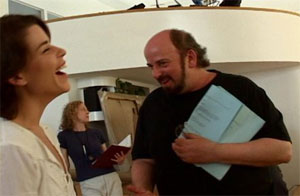 there. It is tight. It is a great, great script, whatever you think about the movie – and I like the movie a lot. But I think he’s got that ambivalence in himself: ‘Who am I? Am I one of them?’
there. It is tight. It is a great, great script, whatever you think about the movie – and I like the movie a lot. But I think he’s got that ambivalence in himself: ‘Who am I? Am I one of them?’
The movie is called The Outsider; David Thomson, film writer, said about Toback that he has the haunted soul of an outsider with the privileged position of an insider. I think that is Toback – he’s always going to be walking that line.
Q: You mentioned the Neve Campbell nude scene. One of the criticisms Toback gets is that he is exploitative. In the documentary he talks about how he’s exploring, but does he ever cross the line into exploiting?
Jarecki: Toback’s a provocateur. It’s not in the film but I asked Neve Campbell if she was feeling exploited, and she said, ‘Am I being exploited? I’m not an idiot. I wouldn’t be here if I didn’t want to be here, and I wouldn’t do anything I didn’t want to do.’ She felt this was a grittier look at sexuality.
I don’t know what exploitation means because for someone to be exploited they have to be ripped off or cheated, and the people Toback works with are pretty darn smart. The chances that a famous movie star is going to allow themselves to be exploited by James Toback is pretty low.
Within the films themselves? Toback has been accused of being misogynistic, hedonistic, whateveristic. Jim lived this way. Jim did have a ménage a trois in Central Park in his 20s. He did live at Jim Brown’s house. I’ll never forget the story of something that happened in the late 60s at Jim Brown’s house involving Toback and Jim Brown and some women, one of whom was a famous movie star. I remember hearing that story and thinking, ‘That is the most ridiculous thing I have ever heard. There is no way that’s true. Jim is completely lying.’ Then about three weeks later there was this thing on Larry King where that movie star was releasing an autobiography and it detailed the sexual encounters at Jim Brown’s house in the late 60s. That always happens with Toback. I’ve learned that, even though I may look at things with a bemused cynicism, Toback has lived a colorful life and that’s what his movies are about. Toback has bet a million dollars on a baseball game. Toback is insane.
Q: Is that what makes him a good director?
Jarecki: Absolutely. If we were just going to see movies about the things we all know about, what would be the point of movies? We’re going to get a peek into somebody’s world that’s different from ours, and I think that’s why we’re so fascinated with crime stories, which is one of Toback’s preoccupations. I was having this conversation with my dad last night and we figured out that the statistical chance of you being murdered is about one out of a hundred. There are about 20,000 murders a year out of 1.2 million deaths. But we’re fascinated by Law & Order and CSI because these are people living on the edges of society, and that’s where things gets interesting. What if I did that? What if I got mad at my boyfriend and killed him? What if I saw a chance to steal some money and took it? What if somebody betrayed me, how far would I go? These are the exciting questions that we want to get into. Any filmmaker who can show us a glimpse of a different world – Paul Thomas Anderson with Boogie Nights and the porn world; Ben Younger with Boiler Room and stocks and frauds. Even Altman with Nashville and this upcoming film – we want to peel back the curtain and look at things we don’t know about, and Toback has had a rich life to show us things that are interesting.
Q: In The Outsider it’s mentioned that one of the titles for the movie Toback is shooting is White Pimp –
Jarecki: Neve Campbell IS the White Pimp!
Q: That seems to sum up the dichotomy. White Pimp is the title of an exploitation film, while When Will I Be Loved is the title of an art film. And they’re both the same film.
Jarecki: When Fingers was originally released it was on a double bill with Drum, featuring Ken Norton. When Roger Ebert walked in to see it the advertising said, ‘Ken Norton is Drum! Jim Brown is Fingers!’ And Jim Brown’s in the movie for like five minutes, so he’s not Fingers.
We cut this out of the documentary – it went on two long – but I had the comparison of the two Fingers posters. There was this Fingers poster that is now on DVD, which is the shot of Harvey with the radio, which is the poster they wanted to use. Harvey and Jim stood outside the Cinema 1 and asked 462 people – they showed them two posters – which do you like better. Then there was the George Barry poster, and it was this ridiculous poster of Harvey’s face as a cartoon with a gun and a dead body, and it’s absurd. It said something like, ‘Fingers: Sometimes they’re all you have left.’ It doesn’t make any sense. They asked 462 and apparently 320 liked their poster, and then Toback called George Barry, who paid for the film and told him, and George said, ‘Alright, I never want to hear about this again.’ They ended up using the exploitation poster.